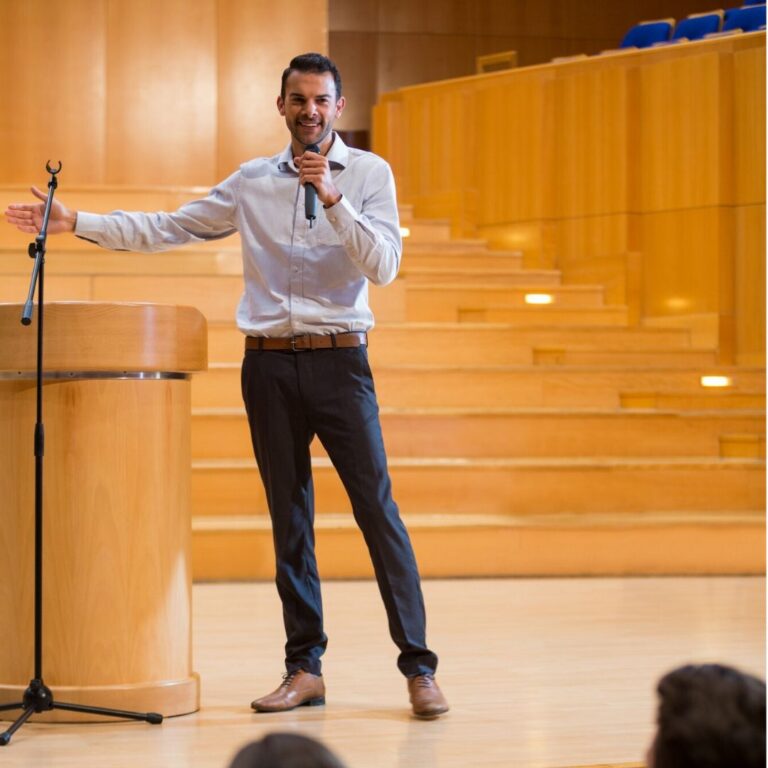
- Home
- How to Make Friends While Learning Spoken English?
- Priya
- 0 Comments
- January 19, 2025

How to Make Friends While Learning Spoken English?
Making friends while learning spoken English can be an enriching experience. Not only does it help improve your language skills, but it also provides opportunities for cultural exchange and emotional growth. In this blog, we’ll explore several effective strategies that can help you make friends while practicing spoken English, ensuring that learning becomes a fun and social journey. Whether you’re a beginner or an advanced learner, these tips will guide you in building meaningful connections.
Join English-Speaking Communities
Why English-Speaking Communities Matter
English-speaking communities offer an excellent opportunity to practice speaking the language in a natural and supportive environment. Being around people who speak English will push you to improve your communication skills quickly. These communities provide a low-pressure atmosphere where making mistakes is part of the learning process.
Where to Find English-Speaking Communities
There are many places where you can find English-speaking communities, both online and offline. Websites like Meetup, Facebook groups, or even local community centers often have meetups or events designed for people learning English. Additionally, language exchange programs can help you connect with native speakers.
How to Build Friendships in These Communities
To make friends, actively engage in conversations, attend social events, and volunteer for community activities. Try to attend regular meetings so you can form relationships with members. Over time, these interactions will help you gain more confidence in speaking English and develop lasting friendships.
Use Social Media and Language Exchange Apps
Leveraging Social Media for Language Learning
Social media is a powerful tool for learning English and meeting people from around the world. Platforms like Instagram, Twitter, and Reddit have numerous language-learning groups where you can interact with others, practice speaking, and share resources. These platforms allow you to engage in both formal and informal conversations, helping you improve your spoken English.
Best Language Exchange Apps
Apps like Tandem, HelloTalk, and Speaky are designed to help people connect with native speakers. These apps allow you to practice English with people who are fluent while also helping them learn your native language. This mutual exchange fosters a sense of community and can lead to genuine friendships.
Tips for Successful Online Conversations
When using social media or apps for language exchange, be clear about your learning goals. Start by introducing yourself, and be open to casual conversations. Practice regularly, and don’t be afraid to make mistakes—native speakers often appreciate the effort and are willing to help.
Attend Language Learning Events and Workshops
Why Language Events Are Helpful
Language learning events such as workshops, seminars, and courses offer a fantastic opportunity to meet other learners. These events often include activities like group discussions, role-playing exercises, and team-based challenges, which make it easy to strike up conversations with fellow learners.
Where to Find Language Events
Look for local language schools or online platforms offering language workshops. Websites like Eventbrite or local community bulletins often list such events. You can also check universities or cultural exchange organizations, as they may host language exchange events or English conversation cafes.
Making Friends Through Language Events
Engage in the activities at these events by talking to your fellow participants. Offer to partner up for practice sessions or attend after-event meetups. The informal nature of these events makes it easier to bond over shared experiences, and friendships often form quickly in such settings.
Participate in Group Discussions and Study Groups
The Benefits of Group Discussions
Group discussions are a great way to practice English and make new friends. When you discuss topics with others, you are not only improving your speaking skills but also learning new vocabulary and phrases. These discussions often provide opportunities to express your opinions, ask questions, and listen to others’ viewpoints.
How to Start or Join a Study Group
If you’re learning English through a course or on your own, try starting or joining a study group. You can use social media or local language schools to find people with similar learning goals. A study group provides a supportive environment for regular practice and can help you stay motivated.
Building Strong Friendships in Study Groups
Be proactive in engaging with group members. Offer help when someone struggles with a concept and ask for help when you need it. These exchanges foster trust and build bonds, creating a sense of camaraderie that can lead to long-lasting friendships.
Volunteer and Engage in Social Activities
Why Volunteering Helps You Learn and Make Friends
Volunteering is a fantastic way to immerse yourself in English and meet like-minded individuals. By volunteering at events or local organizations, you’ll not only improve your language skills but also interact with people who share your passion for helping others. These interactions often lead to friendships that extend beyond the volunteer work itself.
Where to Volunteer and Connect with People
There are numerous volunteering opportunities that require interaction with English speakers. You can look for local non-profits, community centers, or charity events. Many organizations offer volunteer programs for language learners, which also provide a chance to practice speaking English in real-life situations.
Making Friends Through Volunteering
While volunteering, engage with other volunteers and show genuine interest in their backgrounds and experiences. By participating in group activities or socializing after events, you can create meaningful connections. Volunteering often leads to friendships that are based on shared values, which strengthens your relationships.
Conclusion
Making friends while learning spoken English not only improves your language skills but also enhances your social life. By joining English-speaking communities, using social media, attending events, participating in group discussions, and volunteering, you can create a network of friends who will support you on your language-learning journey. The more you engage with others, the more you’ll grow in both language proficiency and confidence. Start practicing today and see how these tips can help you make lasting friendships while becoming fluent in English.
Section Title
Confidence Exercises for English Speaking Speaking English confidently can be a challenge for many...
Tips for Confident English Conversations Speaking English with confidence is essential for effective...
Overcome Fear of Speaking English Enhance your English communication skills to impress clients and...
Impress Clients with English Communication Enhance your English communication skills to impress...
Ace Job Interviews with Business English Boost your confidence and excel in job interviews with...
Negotiate Successfully in Business English Master the art of negotiation in Business English! Learn...
Network Effectively with Business English Learn to network effectively using Business English!...
Polish English for Presentations Delivering a presentation in English requires clarity, confidence...
Key Business English Phrases for Professionals Effective communication in the business world...










Leave a Comment